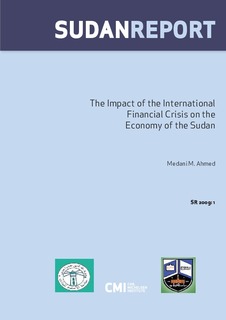The impact of the international financial crisis on the economy of the Sudan
Research report
Permanent lenke
http://hdl.handle.net/11250/2475019Utgivelsesdato
2009-05-13Metadata
Vis full innførselSamlinger
- Publications [1488]
Originalversjon
Bergen: Chr. Michelsen Institute (Sudan Report SR 2009: 1) 30 p.Sammendrag
The ongoing international financial crisis has forced experts, economists, politicians, and decision-makers to assess what is happening and seek to understand the causes, extent and possible impacts of the crisis on the global economy and the economies of developing countries. The initial official response in the Sudan was slow and denied any serious effects on the economy. Later on, however, officials began to admit that there would be some negative effects on the economy and the newly formulated budget for fiscal year 2009 due to the decline in oil revenues. The main objective of this study is to carefully examine the mechanisms through which the economy of the Sudan is being affected. The analysis in section four will focus on the negative impact of the crisis by examining its anticipated effect on various aspects of the economy. Specifically, this paper will investigate the effects on the financial markets, agricultural development, and food prices as well as the fiscal, foreign trade, foreign investment, insurance, and security sectors. Finally, the study will attempt to provide some strategies to deal with the negative impacts of the crisis. Before addressing all the concerns mentioned above, section one will try to understand the causes of the crisis. Section two examines the extent and impact of the crisis on Advanced Developed Countries (ADC), whereas the third section analyzes the crisis’ impact on Less Developed Countries (LDC).
